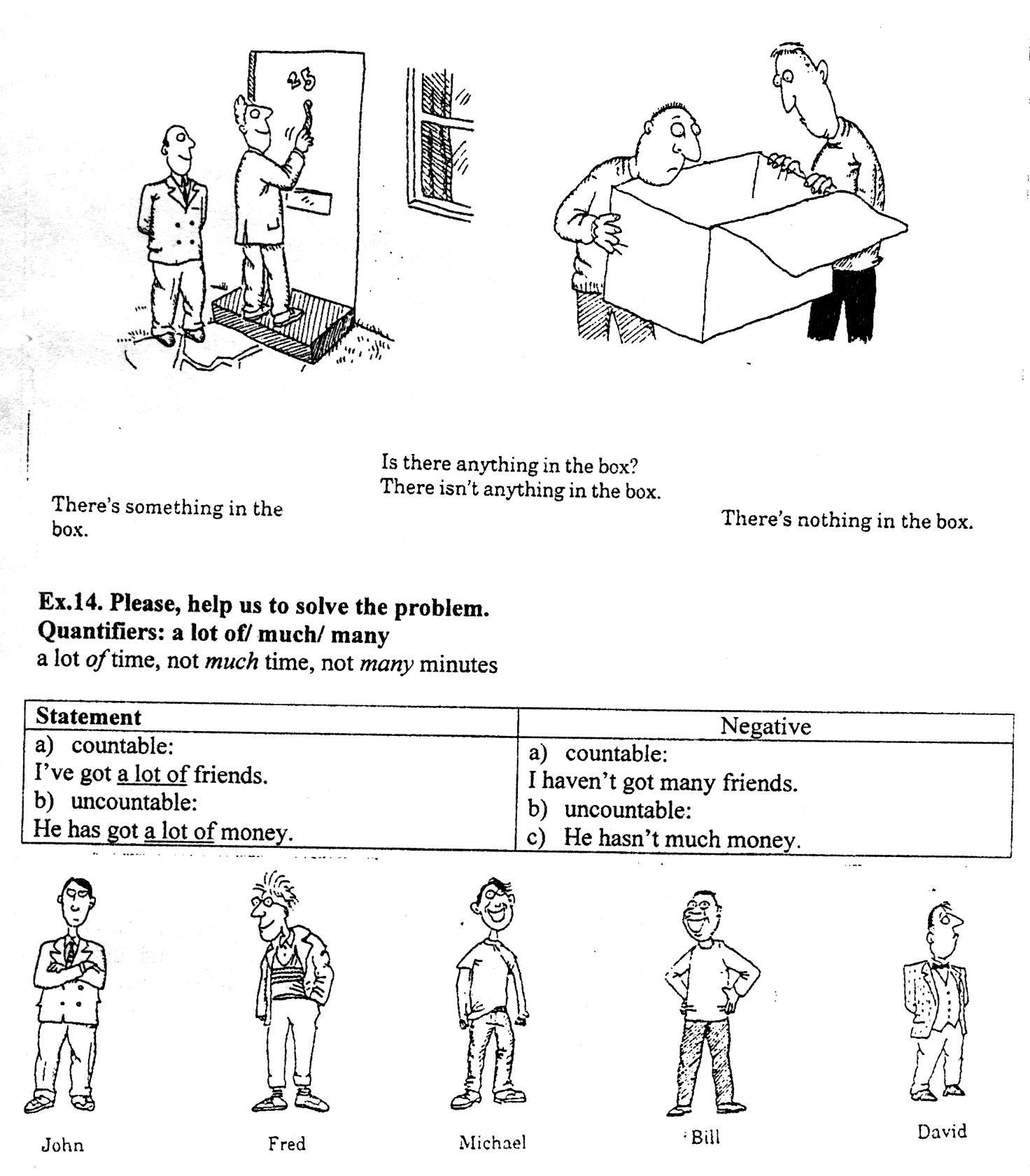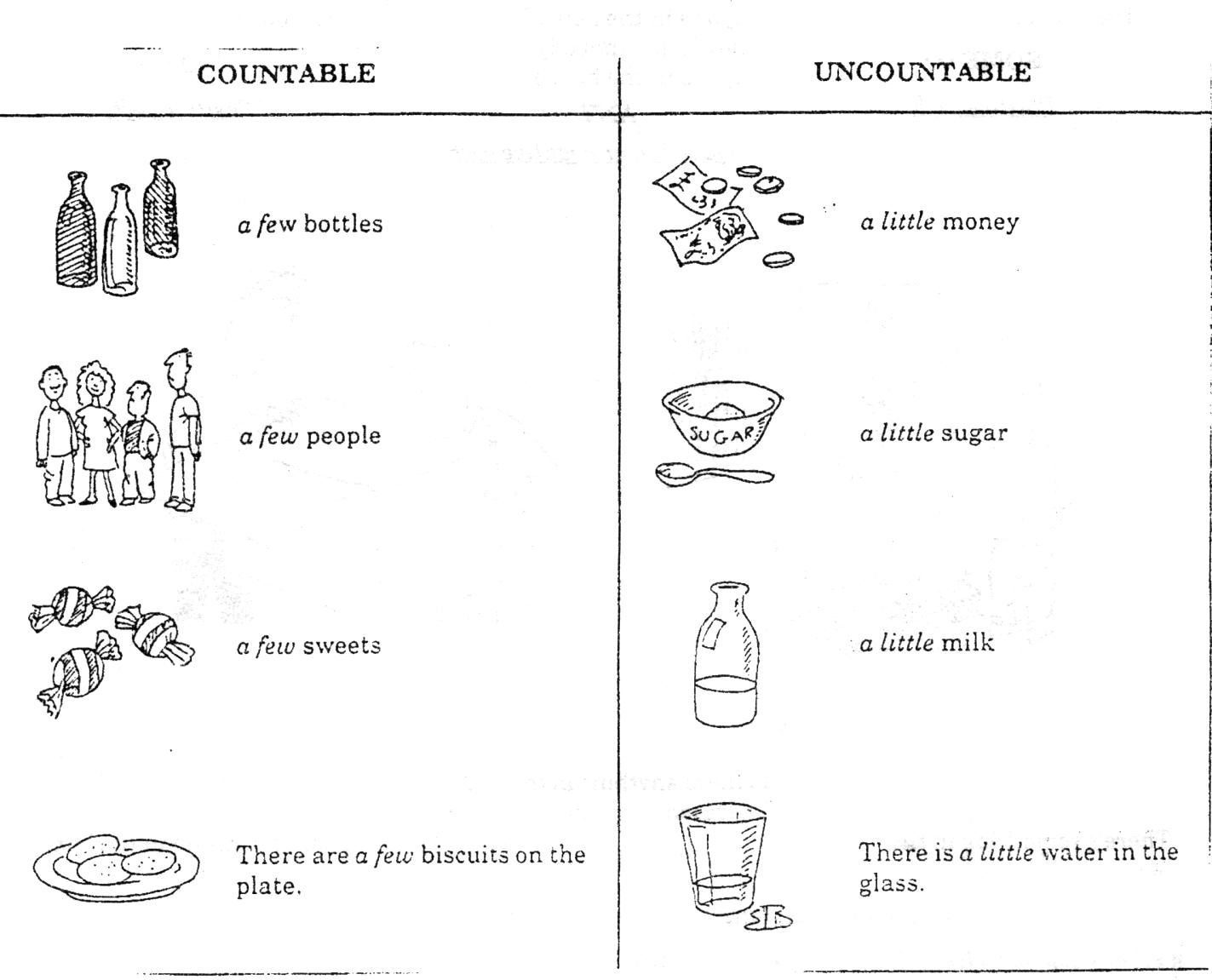
- •Module II
- •Professions and Professional Duties
- •Text b Work Routines
- •Grammar Exercises
- •1) Read the text and write out: a) all the nouns or noun groups; b) adjectives; c) the verbs that deal with qualities of a good business person.
- •Interview
- •2) Read all the nouns, then the adjectives and then the verbs that deal with qualities of a good manager.
- •Grammar Exercises
- •Unit II
- •Means of transport
- •Grammar Exercises
- •Some… any… no…
- •Unit III Text а Travelling
- •On the Road
- •Travelling on business
- •Travel Expenses
- •Answer the following questions.
- •Talk with other students in your group about your last trip:
- •If you have some photographs of your last trip, bring them to class and talk about them with the other students.
- •Grammar Exercises
- •Unit II Text a
Some… any… no…
Positive sentence Question or negative sentence Negative sentence

There’s something Is there anything in the box? There’s nothing
in the box. There isn’t anything in the box.
in the box.
Ex. 11. Choose the correct word:
1. There isn’t _____ computer in the lawyer’s office (no, any, some). 2. We have got _____ paper (some, any). 3. They haven’t got _____ money from their branch (some, any, no). 4. Do you know _____ in the court room? (anybody, somebody, no one). 5. Speak to _____ and find out (nobody, someone). 6. I see _____ in the drawer. (something, anything). 7. What is there on the desk? – I see _____ paper (any, some). 8. Come and see me _____ time you want (any, no).
Ex. 12. Underline the correct item.
There is no one/anyone at home.
There are some/any books on my desk.
If anybody/nobody wants to leave, say it now.
Nobody/anybody phoned this morning.
There is anything/nothing good on TV tonight.
No one/anyone is at home today.
Is there everything/anything I can do to help?
I can’t find my keys anywhere/nowhere.
Ex. 13. Consult the Grammar Focus about Quantitative Pronouns.

Quantifiers: a lot of/ much/ many
a lot of time, not much time, not many minutes
Statement |
Negative |
I’ve got a lot of friends.
He has got a lot of money. |
I haven’t got many friends.
|
Ex. 14. Please, help us to solve the problem.
We have a problem. We must choose the team leader but we don’t know which man to choose. Fill the gaps with a lot of, much, many. Consult the chart above.
John has got _____ managerial skills, but he is too dogmatic. Fred has got _____ money, but he hasn’t got _____ friends. Michael has got _____ charm, but he is too lenient. Bill has got _____ analytical abilities, but he hasn’t got _____ style. David has got _____ clothes, but he hasn’t got _____ social skills.
Who, do you think, we must choose? Why?
Unit III Text а Travelling
People can travel on business or for pleasure and for this they use different means of transport.
Passengers buy tickets at the booking-office at the railway station or at one of the agencies. It is advisable to buy tickets in advance.
On the day of departure the passenger gets to the railway station, finds the necessary platform and shows the ticket to the conductor of his/her car, finds his/her seat or berth (upper or lower) and puts the luggage on the luggage rack. When the train leaves the station the conductor meets passengers, checks their tickets, and brings in the bedding and tea. In the carriage one can read a book or a magazine to while away the time during the journey. If the passenger is hungry, he may go to the dining-car (carriage). A foreigner always notices the platforms in Britain and the USA. The platform in those countries is almost on a level with the floor of the carriage. This makes it easier to get on and off with the luggage.
Businessmen prefer to fly by plane, especially in the travel abroad. A plane will take the passenger to any part of the world in as many hours as take days to travel by other means.
At the airport the traveller first goes through the Customs and the passport control. The clerk in the check-in-desk checks the ticket, weights the luggage and gives him a boarding pass/card. The passengers have to wait for the flight in the departure lounge. In some time the loudspeaker announces the flight and the passengers go to the departure gate, where the hostesses meet them, check their boarding passes and show them to the seats. The seats in the plane are comfortable and movable. The captain of the plane greets the passengers on board the plane and wishes them a good journey.
Soon the plane begins to take off, the hostess asks the passengers to fasten seat belts/safety-belts (when the plane reaches the necessary altitude the passengers unfasten the belts). During the flight the hostesses take care of the passengers. They bring food and drinks and, if a passenger feels bad, they bring the medicines too. The plane begins to land and the passengers see “Fasten the Belts“ sign on the display. In the foreign airport they get through the passport control and the Customs again.
Businessmen usually stay at a hotel and, as a rule, they reserve a room in advance. The clerk at the reception desk checks a reservation, asks to fill in a special form and gives the key to the room.
Checking out time at all hotels of the world is midday. Those, who stay at a hotel, usually eat out in a restaurant or a cafe. Sometimes, when they are too tired, after a busy day, they can order food over the telephone and a waiter will bring it into the room.
Ex. 1. Put the words in the right order and answer the following questions:
1. Where/ buy tickets/ do/ we?
2. do/ What/ the conductor/ does?
3. we/ do/ in the carriage/ the time /What/ to while away/ do?
4. do/ about the platforms/ What/ in Britain and the USA/ you know?
5. the traveller/ What/ first do/ at the airport /does?
6. do/ What / during the flight/ do the hostesses?
7. usually/ Where/ businessmen / do/ stay?
8. won’t he/ will/ at the reception desk/ check a luggage/ The clerk?
9. shows/ Who/ to the seats/ the passengers?
Ex. 2. Make up questions to get these answers:
The seats in the plane are comfortable and moveable.
Yes, they do. Passengers usually buy tickets in advance.
They put their luggage on the luggage rack.
I think traveling by car is the most convenient.
When passenger gets to the railway station he finds the necessary platform and shows the ticket to the conductor.
The conductor brings the bedding and tea.
No, they don’t. At the airport the traveler first goes through Customs and passport control.
The hostess checks the boarding pass.
The passengers fasten seats belts when the plane begins to take off.
10. They see “Fasten seat belts” sign on the display.
Ex. 3. Match the English words and word-combination from set A with their Ukrainian equivalents from set B.
Set A |
Set B |
to bring in the bedding and tea |
замовити їжу за телефоном |
the travel abroad |
піти в вагон ресторан |
to order food over the telephone |
пройти митницю та паспортний контроль |
to buy tickets at the booking- office |
провести пасажирів до місць |
on board the plane (ship) |
поїсти в ресторані |
checking out time |
на багажній полиці |
on the luggage rack |
пристебнути ремені безпеки |
to greet the passengers |
купувати білети в білетній касі |
to travel on business or for pleasure |
привітати пасажирів |
on the day of departure |
знайти ваше спальне місце |
to wish a good journey |
подорожувати по справах або для задоволення |
to show passengers to the seats |
подорож закордон |
to have to wait for the flight |
побажати гарної подорожі |
eat out in a restaurant |
на борту літака (корабля) |
to fasten seat belts |
приносити постіль та чай |
to reserve a room in advance |
день відправлення |
to go through the Customs and the passport control |
час звільнення номеру в готелі |
to find your berth |
необхідно чекати рейсу |
to go to the dining-car |
зарезервувати кімнату заздалегідь |
Ex. 4. Travelling by rail.
Divide the words in 5 columns under the following headings.
a) verbs to do with train b) kinds of tickets c) travelling by rail
d) people e) places
1. booking office 2.dining car 3. show (your ticket) 4. get to café 5. single ticket 6.conductor 7. miss 8.driver 9. passenger 10. get off 11. information office 12. compartment 13. get on 14. to bring in the bedding 15. platform 16. catch 17. return ticket 18. waiting room 19. upper (lower) berth |
Ex. 5. a) The following sentences describe what usually happens when you travel by train (A) or by plane (B). Put them in the right order.
b) Make up stories with these sentences. Use such words as:
First of all, then, as soon as, if, after that, finally, when.
A.
__ The conductor checks the tickets.__ You get off the train. __You put the luggage on the luggage rack. __You buy tickets at the booking office in advance. __You find your berth. __You may go to the dining car. __You read the book to while away the time. __The conductor brings in the bedding. ___The train leaves the station. ___You show your ticket to the conductor. __You find the necessary platform. __You come to the railway station. __You get on the train.
B.
__The hostess checks your boarding pass and shows you to the seat. __The plane begins to land. __You go to the departure lounge. __You arrive at the airport. __You go to your departure gate. __You go to the check-in-desk. __The plane begins to take off. __You get a boarding card. __You board (get on) the plane. __The clerk weights the luggage. __You (un)fasten seat belts. __You check in your luggage. __You look at the departure board to see if your flight is already boarding. __The hostess brings food and drinks. __The loudspeaker announces the flight and the gate to go to. __You go through passport control. __The hostess meets you. __You buy tickets at the booking office in advance.
Ex. 6. Read these conversations and make up your own dialogues using the words below instead of the underlined words.
